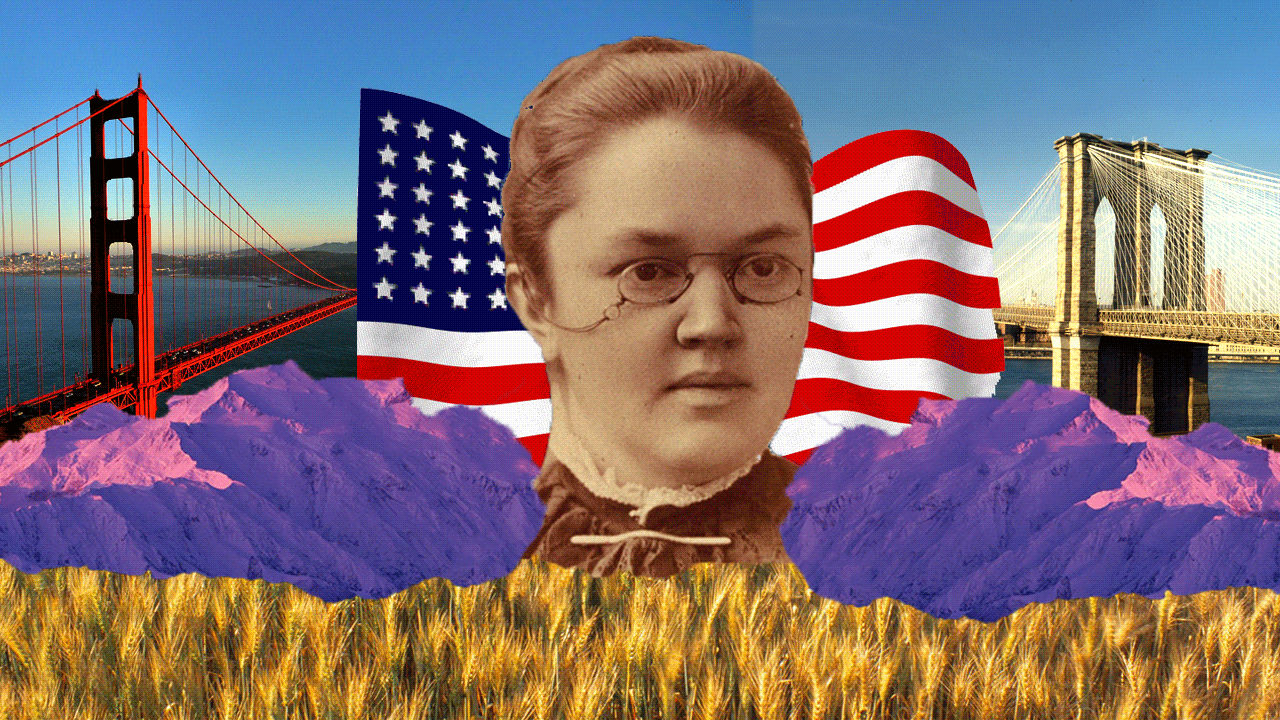The seeds of “America the Beautiful” were planted on a train. In the summer of 1893, Katharine Lee Bates, a 33-year-old English professor at Wellesley College, was traveling from her home in Massachusetts to Colorado, where she would be spending the summer teaching. While on her way, she took in the sights of the country — the spacious skies, purple mountains, alabaster cities, and amber waves of grain she would later immortalize in song — and was inspired by their beauty. Finally, atop Pikes Peak, she penned the first draft of the lyrics.
 Bates’s words were eventually set to a hymn by Samuel A. Ward, and in 2014, “America the Beautiful” was used in a Coca-Cola commercial during Super Bowl XLVIII. For many viewers, it was unremarkable: another corporation cashing in on the idea of America, conflating devotion to country and devotion to product, during a broadcast that, as always, was filled with that sort of thing.
Bates’s words were eventually set to a hymn by Samuel A. Ward, and in 2014, “America the Beautiful” was used in a Coca-Cola commercial during Super Bowl XLVIII. For many viewers, it was unremarkable: another corporation cashing in on the idea of America, conflating devotion to country and devotion to product, during a broadcast that, as always, was filled with that sort of thing.
For others, it was a grievous offense. Not because the Coca-Cola Company was cynically manipulating their patriotism for profit, but because the spot included “America the Beautiful” sung in English, but also Spanish, Hindi, and a host of other languages. The #fuckcoke hashtag was instantly born on Twitter, and on Monday, Glenn Beck arrived to stoke the righteous anger like a dog drawn to the scent of its own shit. He pled with the company: “Why did you need that to divide us politically? Because that’s all this ad is.”
 It was a curious reaction. Leaving aside the obvious xenophobia in railing against the use of non-English languages in a nation that has no official tongue, there’s the song itself. “America the Beautiful” praises the titular nation, yes, but it’s also openly critical. Bates’s first draft, as David Firestone pointed out in a 2012 blog post for the New York Times, included these scathing lines about inequality: “America! America!/God shed his grace on thee/Till selfish gain no longer stain/The banner of the free!”
It was a curious reaction. Leaving aside the obvious xenophobia in railing against the use of non-English languages in a nation that has no official tongue, there’s the song itself. “America the Beautiful” praises the titular nation, yes, but it’s also openly critical. Bates’s first draft, as David Firestone pointed out in a 2012 blog post for the New York Times, included these scathing lines about inequality: “America! America!/God shed his grace on thee/Till selfish gain no longer stain/The banner of the free!”
Though that stanza was eventually softened, the song’s final version doesn’t pull punches. The second verse, which mentions the “thoroughfare to freedom beat across the wilderness,” before asking that “God mend [America’s] every flaw,” could be interpreted as a plea for divine forgiveness after the slaughter of countless Native Americans. Again, the Times explains, this time in a post by Lynn Sherr.
The ‘pilgrim feet’ of course belong to our country’s founders, but the ‘thoroughfare for freedom’ they beat ‘across the wilderness’ is not an unblemished path to glory. Bates was well aware of the near annihilation of Native Americans, which was why she immediately prayed for help, both divine and human.
Then, there’s the question of the song’s composer, a fiercely independent woman who relished her position at what a colleague referred to as the “fringes” of life. Katharine Lee Bates lived together with Katharine Coman, a fellow Wellesley professor, for 25 years, and wrote a volume of poetry in her honor. The historian Judith Schwarz has written that it is “obvious…Katharine Lee Bates and Katharine Coman were a devoted lesbian couple.” According to Sherr, Bates, though Christian herself, nearly left Wellesley after faculty were required to pledge their allegiance to the church, and fondly remembered her hometown of Falmouth, Massachusetts, as “a friendly little village that practiced a neighborly socialism.”
Bate’s bona fides as the kind of American that Beck and the #fuckcoke brigade would despise are readily apparent, but if you’re wondering whether she would support Coca Cola’s message of multiculturalism, consider her defection from the Republican Party. The 1924 presidential election pitted the Republican incumbent Calvin Coolidge against John W. Davis, a West Virginia Democrat. A key issue was the U.S.’s entry into the League of Nations, the predecessor to the United Nations; Davis was for it, Coolidge wasn’t, and as a result, Bates voted blue.
Coolidge’s opposition to the League was, to Bates, a betrayal. In her words, entry into that international group, which would ally the U.S. with nations as far-flung as China, Cuba, Nicaragua, and Iran, was “our one hope for peace on earth.”
(Image: Marina Galperina/ANIMALNewYork)


